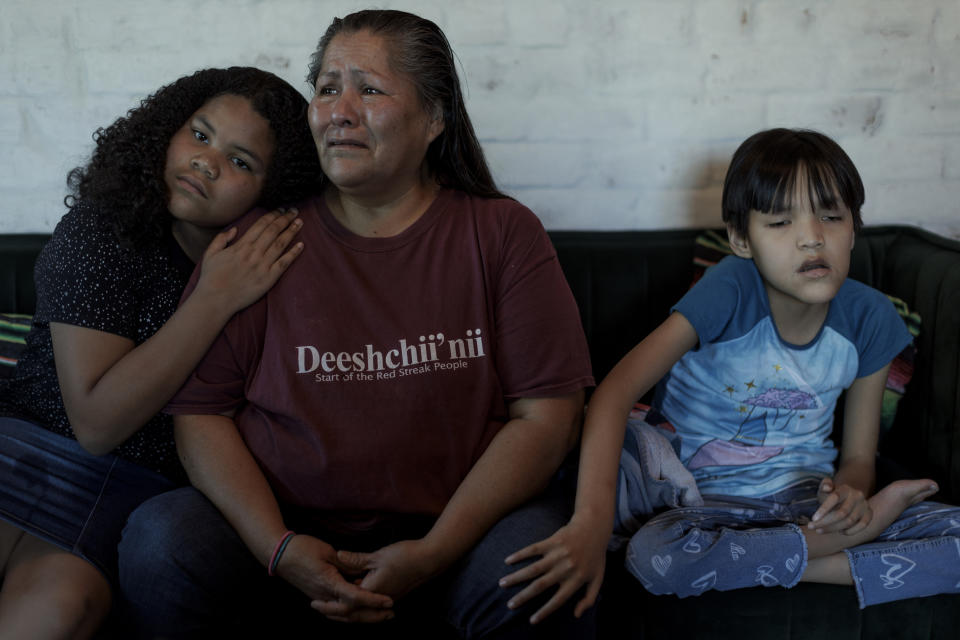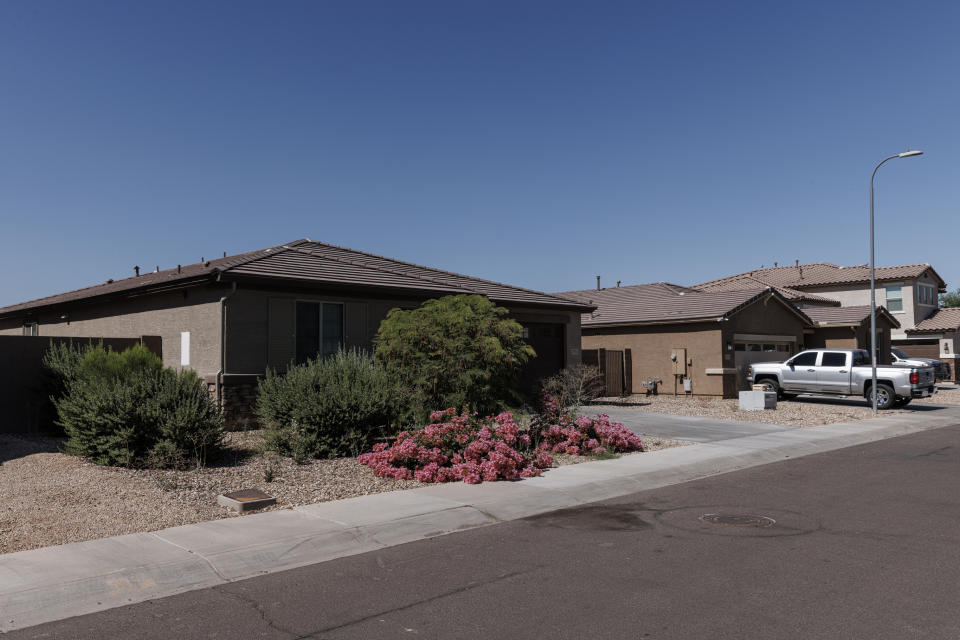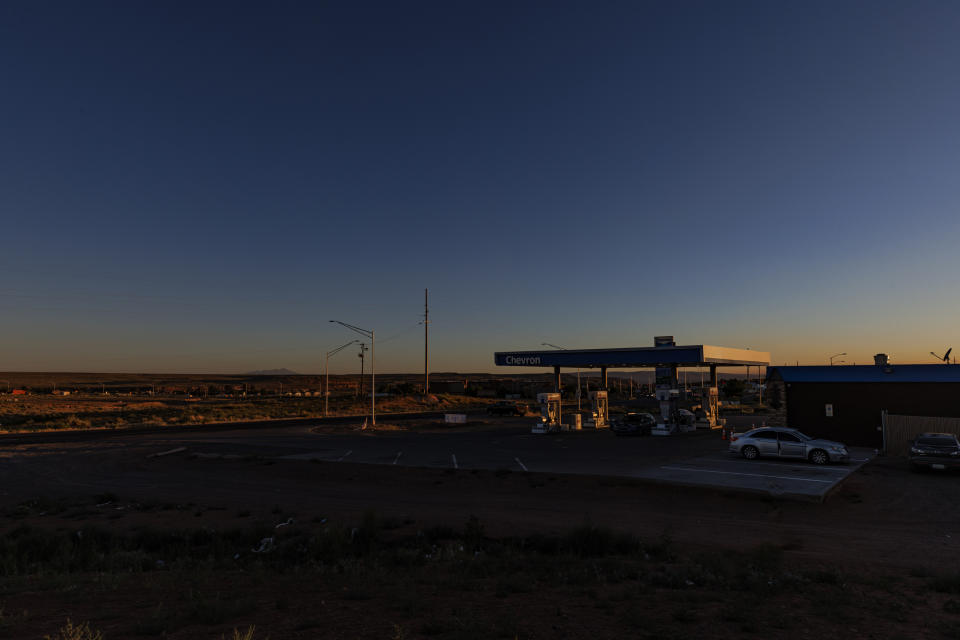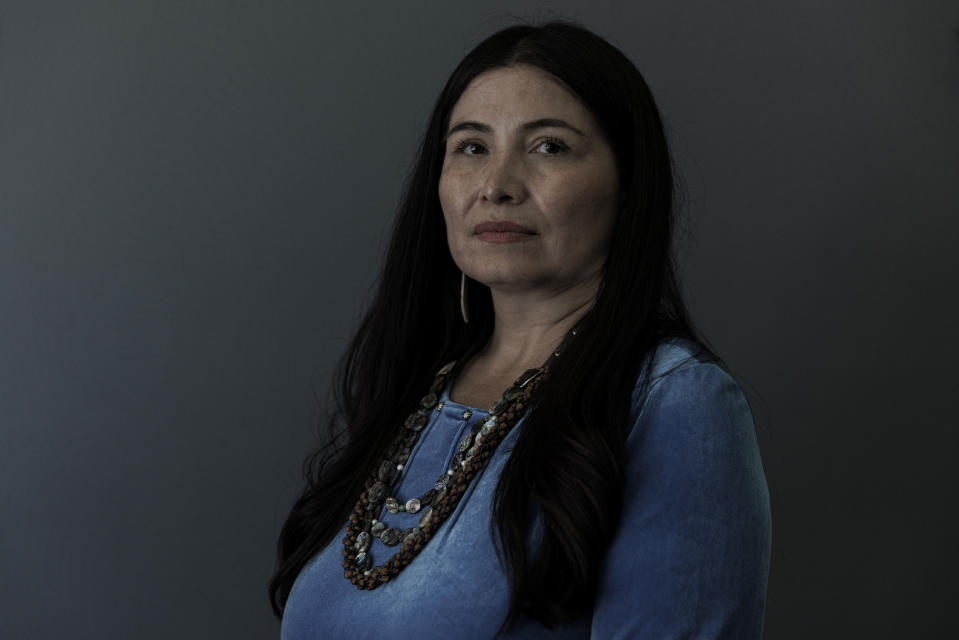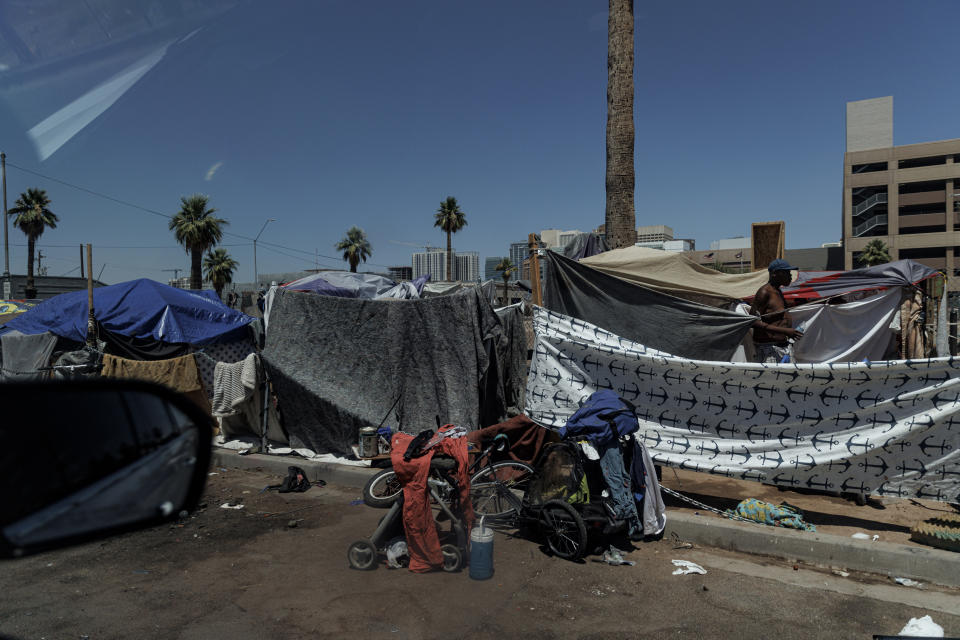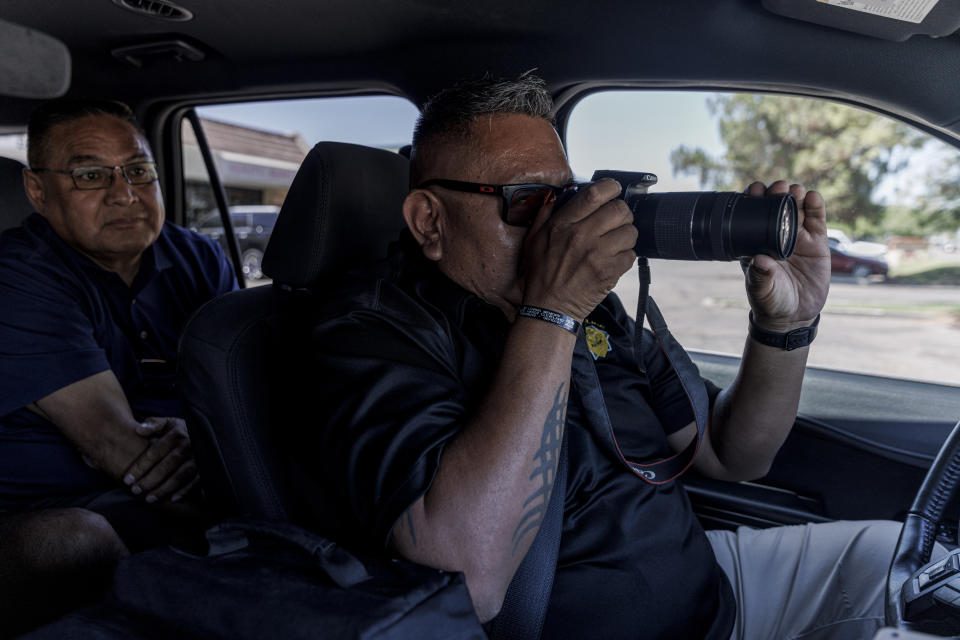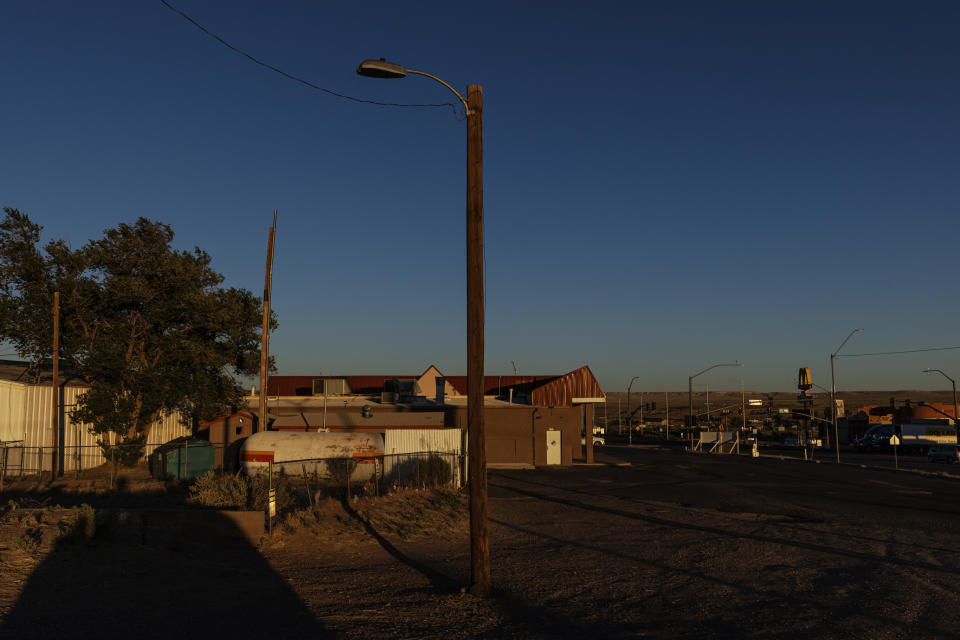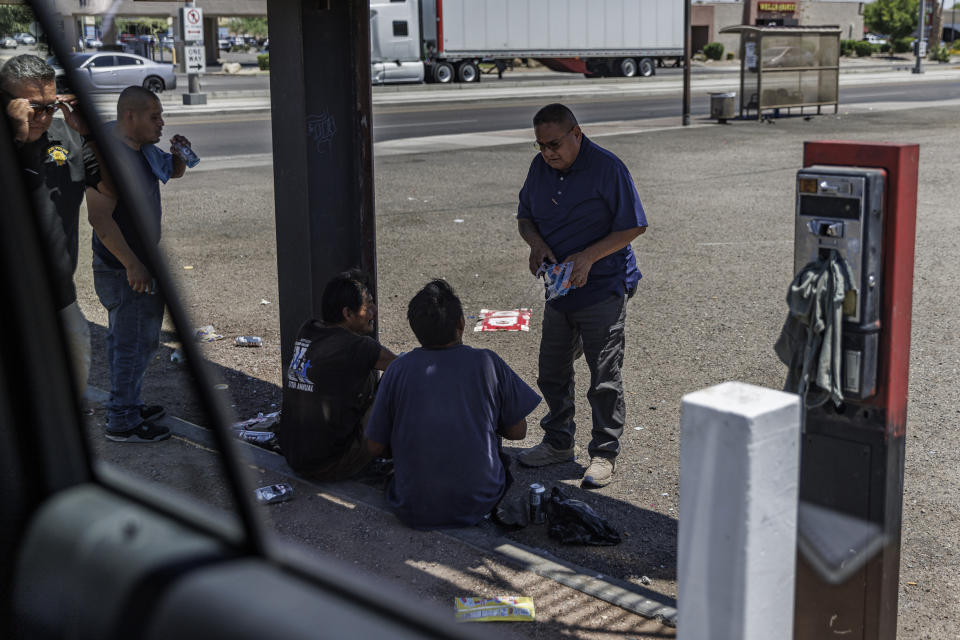Sober homes promised help and shelter. Some delivered fraud, officials say.
PHOENIX - Ruby Foote and her two young daughters were homeless again, crashing with relatives back on the Navajo Nation reservation. So the pitch from a family friend felt like an answered prayer: room and board in a Phoenix sober-living home for at least a year and treatment for Foote's longtime drinking habit.
But at the sober home, tensions flared between residents, Foote recalled. Her 10-year-old daughter felt bullied. And Foote dipped into her own government benefits to buy food for others. Addiction treatment, she said, consisted of long classes at a stuffy outpatient clinic owned by the same people that operated the sober home.
Then, two months later, Foote abruptly found herself homeless again. The outpatient clinic affiliated with the sober home was suspended from Arizona's Medicaid program amid suspicion of filing bogus bills - one of more than 200 outpatient clinics to face such a fate this year, according to state officials. The sober home, in turn, was shuttered. And Foote had become ensnared in a sprawling web of alleged fraud.
"I'm still really upset with how we were used," Foote, 56, said. "These people need to be stopped."
In a state beset by the despair of homelessness and addiction, officials are still untangling the extent of alleged fraud committed by unscrupulous treatment centers and group homes during the past three years. Officials assert the schemes may have cost taxpayers hundreds of millions of dollars, while sparking wide-reaching fraud investigations, dozens of indictments, and an overhaul of billing practices by Arizona's Medicaid agency for crucial mental health and addiction treatment services.
Officials say the scheme has disproportionately affected Native Americans, with many left hundreds of miles from their families who remain back on reservations in northern Arizona, New Mexico and as far as Montana.
Navajo Nation leaders declared a public health emergency and created a task force to scour the sweltering streets of Phoenix for the displaced. Separately, an Arizona grass-roots group called Stolen People, Stolen Benefits has fielded calls, texts and Facebook messages from relatives of missing tribal members. The group, which relies on donations and hands out care packages on the Phoenix streets, says it has arranged bus trips and airfares for at least 100 tribal members wanting to return home. "We've been going nonstop," said Reva Stewart, who co-founded the group after her cousin was lured into a Phoenix sober home.
In August, the New Mexico attorney general unveiled a campaign warning unsheltered people from "being lured" into traveling across state lines "to illegitimate recovery facilities." The Blackfeet Nation in Montana in July declared a state of emergency aimed at helping displaced members, while one of the state's senators, Jon Tester (D), demanded an investigation from the federal agency that oversees Medicaid services.
Officials have described clinics allegedly billing for treatment services for children who don't need help, or people who are dead or jailed. Clinics are suspected of falsely charging the state for patients who aren't Indian under a Medicaid program for Native Americans. Recruiters in white vans are suspected of enticing Native Americans into group homes, sometimes plying them with drugs and alcohol, while offering little or no treatment, investigators said.
- - -
'It blows my mind'
Across Arizona, the fallout has been pronounced. Attorney General Kris Mayes (D) in May called it "one of the biggest scandals" in state history.
Fraud involving substance-use treatment has flourished alongside the nation's addiction crisis, with more than 100,000 fatal overdoses in the United States each of the past two years. During the past decade, major rings from California to Florida were discovered fraudulently billing state or federal health programs. Federal prosecutors in May secured fraud indictments against operators of sober homes in Massachusetts.
In Arizona, the fraud allegedly targeted the Arizona Health Care Cost Containment System, which administers federal Medicaid funds. The program covers 2.4 million people in Arizona, about 1 in 3 people in the state. More than 2,700 people died of drug overdoses in Arizona in 2022, federal estimates show. For tribal nations, the problem is acute: In recent years, the highest overdose death rates in the United States have been among Native Americans.
The fraudulent activities, officials say, included exploiting a Medicaid code that allows centers providing intensive outpatient treatment to bill for counseling, classes and other therapy for patients with alcohol and drug-use problems. Generally, Arizona paid nearly 60 percent of bills filed under that code - with no questions asked, officials said.
"Individuals engaged in these fraud schemes could get paid up to approximately $1,200 per day per person," said FBI Special Agent Antoinette Ferrari, who is investigating the alleged Medicaid fraud.
It remains unclear why the fraud escalated when it did.
Long-established providers say that about three years ago, they began noticing a spike in social media posts about new sober homes and outpatient treatment centers. Meanwhile, they said, it became increasingly difficult to buy vans - used to transport patients to treatment - as the number of providers skyrocketed.
Investigators believe some sober homes have been working hand-in-hand with treatment clinics, which allegedly billed the state's Medicaid agency for exorbitant amounts and in turn kicked back money to the sober homes. In many cases, the operators of the homes and the clinics are the same, officials say.
Officials have blamed a ring that allegedly committed similar crimes in Nevada before moving on to Arizona. Taxpayers in Arizona footed a hefty bill. In the 2019 fiscal year, the Medicaid program was billed under a behavioral-health code for $53 million, according to the attorney general's office. By 2022, that had soared to $668 million. Authorities are still figuring out how much of that billing was legitimate.
"Some of these people dealing with addiction truly want help, and that's lost in all of this," said Kim Humphrey, executive director of the Phoenix nonprofit Parents of Addicted Loved Ones who has been hearing from frustrated relatives of patients who entered pop-up sober homes.
Officials say much of the fraud involved the American Indian Health Program, which allows providers to bill for services directly to the state's Medicaid agency rather than through a managed care organization. The program required only an acknowledgment that someone was a tribal member.
"It blows my mind there was no oversight. These are federal dollars," Navajo Nation Attorney General Ethel Branch said. "Our people deserved as much care and concern for how services are being delivered to them."
To entice patients, officials say, recruiters flocked to flea markets and grocery stores on reservations in Arizona and New Mexico and outside homeless shelters, offering rooms in residential sober-living homes or even contracted hotels. The Arizona Department of Health Services licenses sober-living homes and behavioral health resident facilities, although many are believed to have been unlicensed.
A few months ago in New Mexico, Lesheena Charley said, she was approached by a group of men outside the Albuquerque Indian Center, which feeds and assists the homeless. Charley, 35, said they offered her and other homeless people $100 gift cards to get in the vans and "kick drugs" at a treatment center in Phoenix. She declined - the men didn't have business cards or even fliers. "It didn't feel right," said Charley, who has grappled with heroin, meth and alcohol use.
So many drug users and homeless people in Albuquerque began disappearing from the area that activist Christine Barber posted signs warning of the vans and compiled a list of the missing, now numbering more than 60. "We still have so many people missing," said Barber, who started a nonprofit called ASUR New Mexico and a street newsletter to warn of what she calls people brokers.
- - -
A crisis of homelessness
Arizona has experienced an alarming rise in homelessness - 23 percent between 2020 and 2022, with many sleeping in cars, streets and parks, according to an annual report by the U.S. Department of Housing and Urban Development. Like in cities across the nation, officials blame a lack of affordable housing. A state committee reported in December that Arizona is short 270,000 homes.
Deonna Crawford, 32, a Phoenix nursing assistant and mother of four, got evicted this year after her rent increased. She said she and her family were living in a park when a homeless-outreach coordinator referred her to Mireille Wellness Clinic, the clinic affiliated with the same home where Foote stayed. Crawford saw red flags immediately, she said. She does not have an addiction problem but went to drug-treatment classes to stay sheltered.
"I felt like it was my only option," Crawford said.
Mireille's operator is listed in state records as Mireille Mukiza. Another woman, Angelique Kamagaju, was listed in a company document as the clinic's director of residency. Repeated emails, voice mails and text messages to both women went unanswered. A Phoenix attorney who represented Kamagaju in a zoning matter did not return a call or email seeking comment. Nobody associated with the clinic has been charged, and the Arizona Department of Health Services lists the facility as having an active license as an outpatient treatment center.
Still, the Arizona Medicaid agency has the clinic on a list of providers suspected of fraudulent billing.
Crawford, Foote and their families were housed in a five-bedroom chocolate-and-tan house on Atlantis Way in a subdivision about 13 miles from downtown Phoenix. Each day, adults were driven in vans to classes that consisted of YouTube videos and generic lectures about ways to stay sober, Crawford said. She remembered they twice watched the 2006 comedy "Talladega Nights: The Ballad of Ricky Bobby."
When Crawford's Medicaid-managed care insurance was running out, she says she was instructed by a clinic staffer to change to the American Indian Health Program. Crawford is not Native American.
Mukiza and Kamagaju together own the Atlantis Way home, among other residential properties in Maricopa County, records show. The clinic in January also paid $3.4 million for a 10,200-square-foot mansion with a diving pool, a lazy river and an outdoor pizza oven, according to public records and real estate listings. One of Kamagaju's companies also owned a motel about an hour outside Phoenix that was used to house patients for the clinic, according to public records.
- - -
'A game of whack-a-mole'
Overall, the Arizona attorney general's office says its probes have resulted in at least 45 indictments. The state Medicaid agency continues to refer investigations to federal authorities, said Andy Stone, chief of the financial crimes and public corruption division at the U.S. attorney's office in Arizona.
"This will be something our office will be working years in the future," Stone said. The FBI, IRS and Department of Health and Human Services Office of the Inspector General are also investigating.
So far, the U.S. attorney's office has secured one indictment, against a woman named Diana Moore, who pleaded guilty to wire fraud and money laundering. Her case offers a window into how the fraud works: Between 2019 and 2022, Moore applied with the state's Medicaid agency to provide services for patients at her three behavioral-health-care facilities. To hide her ownership stake - and avoid disclosing a prior felony conviction, as required - Moore claimed others owned the facilities, according to a federal plea agreement.
Moore paid other providers to ferry people to her facilities, often for a single day to record their state Medicaid ID numbers, the plea agreement said. Then, Moore submitted bogus bills claiming her homes were providing counseling services for up to 90 days - sometimes for eight or more hours each day, "five days a week, for months in a row," knowing such treatments were not taking place, the agreement notes. Moore even billed for people who were dead or in prison.
In all, Arizona's Medicaid agency paid Moore's clinics $22.4 million. She purchased seven luxury cars, including four Mercedes-Benz vehicles, two Cadillac Escalades and a Land Rover Range Rover, plus dozens of other items, including designer purses, jewelry and art, according to court documents. Moore, who is scheduled to be sentenced Dec. 18, is forfeiting four properties. Moore's attorney did not respond to a request for comment.
Arizona's Medicaid agency insists it implemented sweeping overhauls, pausing enrollment of new behavioral outpatient clinics and transportation operations for at least six months. The agency slashed what it is paying providers, and in July, it required that providers submit patient treatment plans before receiving payment. The Medicaid agency said the changes were needed for "the prevention of fraudulent activities by bad actors."
The regulatory pendulum swing, however, could hurt long-established providers. "In an effort to eradicate the fraud in our communities, the state has made it increasingly difficult for even the good actors to deliver services to the Native American population," Lee Yaiva, CEO of Scottsdale Recovery Center, said in a statement.
Officials instituted a phone line, 211, for displaced people to find services and housing, in conjunction with Operation Rainbow Bridge, the Navajo Nation's task force to locate its citizens. Since May, working with 211, officers have made contact with dozens of Navajos on the streets but far fewer than tribal officials had expected. Branch, the Navajo Nation's attorney general, believes "patient brokers" might be shuffling patients to facilities not on law enforcement's radar.
"It's still a game of whack-a-mole," she said.
On a summer weekday in Phoenix, longtime Navajo police Sgt. Roland Dash and Rainbow Bridge operations manager Harland C. Cleveland eased down 19th Avenue, a hardscrabble stretch of vape shops, taco joints and discount stores frequented by tribal members. Dash heads the missing persons unit in Tuba City, Ariz., where two years ago, young men who would normally get in trouble for public intoxication began vanishing and turning up in Phoenix.
Cleveland and Dash scoured trolley stops, parks and gas stations looking to contact tribal members, offering them help to get back to the reservation or just a cold bottle of Gatorade. The temperature topped 110. Dash furiously scribbled notes in a steno pad.
"I think we have a lot more out there that we haven't made contact with," Dash said.
Cleveland peered through binoculars at men sitting under a billboard. Minutes later, the officers pulled over. Christopher Benally recounted how a recruiter approached him at a homeless shelter about two months before, promising treatment and new clothes if he provided his American Indian insurance information. Benally entered a group home, where he enjoyed a big-screen television in his room.
"They kept giving me beer," Benally said. "They were getting me . . . drunk every day!"
Benally doesn't want to return to the reservation. So Dash texted the man's sister back in Tuba City to let her know he was okay.
Foote, the Navajo mother, wants to return to the reservation one day if she can get her life in order.
She lost her 17-year-old daughter to a heart ailment in 2015. During the pandemic, Foote lost a niece to covid-19, then her mother to kidney cancer, and she and her two youngest mostly stayed in Phoenix during that period with her adult daughters, adding to already crowded homes. Many nights, she disappeared to parks and bus stops to drink cheap beer and Fireball Cinnamon Whisky. "It would make me forget my problems for a while," Foote said.
Foote returned to the reservation for a few months before ending up back in Phoenix at the sober home. Today, Foote lives in a women's shelter, where she plans to stay for a few more months. She has managed to steer clear of alcohol and hopes to qualify as a caregiver for her 15-year-old daughter, who has a neurological condition, and receive payments through the girl's disability benefits.
"And we're hoping to get our own apartment soon," Foote said.
